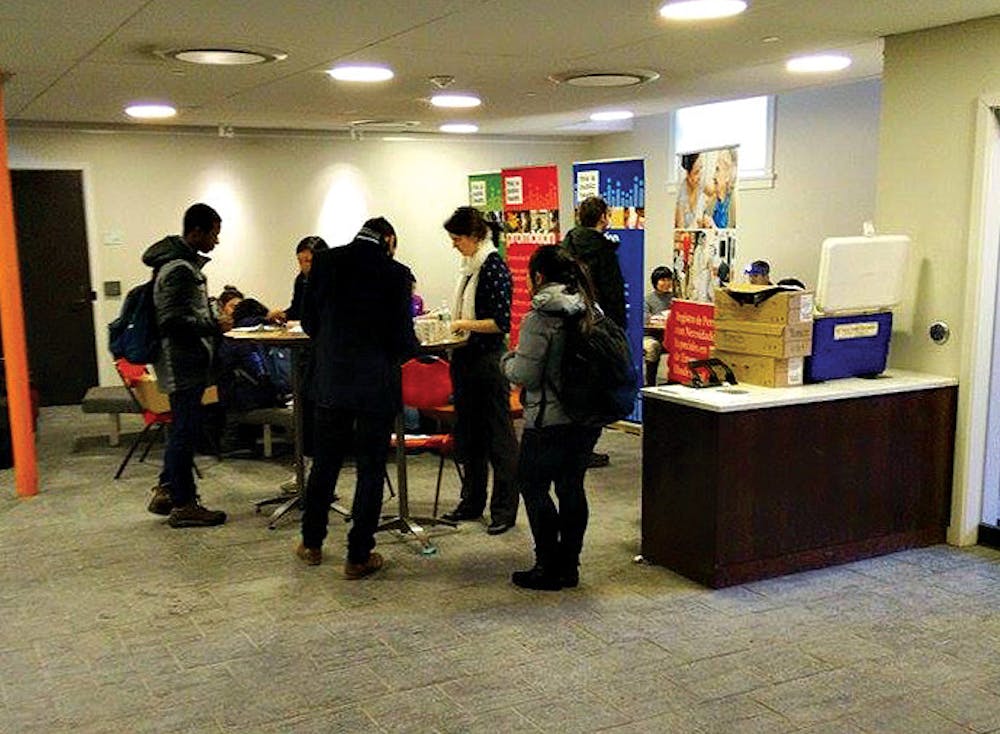A meningitis study will take place on campus March 2-5, Medical Director of Health Services Unab Khan announced in a campus-wide email Feb. 27. Representatives from the Centers for Disease Control and Prevention and the Rhode Island Department of Public Health will swab students’ throats to test for the meningococcus bacteria. Stations are set up in the lower floor of the Stephen Robert ’62 Campus Center as well as in the Chancellor’s Room at the Sharpe Refectory.
Over the four-day period, the representatives aim to swab 1200 participants between 18 and 22 years of age to learn more about the bacteria’s circulation on university campuses that have never reported cases of meningitis, according to the email. On the first day, more students were swabbed at the Ratty than at Faunce, said Lucy Breakwell, an epidemic intelligence service officer at the CDC, adding that she hopes more students will participate in the study.
While the initiative is voluntary, there is an incentive to participate: Students who are swabbed receive a $5 gift card redeemable at retailers such as Amazon.com. Breakwell said students have been so eager to participate that they forget the reward. “Everyone seems really happy with the process. People are walking out without collecting their vouchers. They are just coming in to help us out, and we have to chase them back down,” she added.
Students who were swabbed emphasized the importance of volunteering and ease of the process. “My mom is a nurse. I think participation in medical studies is important, if you can,” said Edward Cleofe ’15.
Participating in the study was not time-intensive, said Mara McCrickard ’15, who was one of the students swabbed on the study’s first day. The email said that participation would take no more than 15 minutes.
“I saw it in the Morning Mail, and it looked cool, and you get a $5 gift card, so why not?” said Elizabeth Montoya ’16.
While the University does not have any reported cases of the meningococcal bacteria, representatives from the CDC and RIDOH said they hope to gain a deeper understanding of how the bacteria spreads. “Meningitis is spread by droplets, so if you are in close proximity to people and are getting saliva droplets on you, then you are likely to be transmitted the bacteria,” Breakwell said. “However, you need someone to be carrying or infected with that bacterium before that happens. This whole study is informing us about that because we just don’t have that much information about carriage.”
There is “very little data on what carriage rates are in university students,” said Sarah Meyer, an epidemic intelligence service officer at the CDC. About 5 to 10 percent of the national population carries the bacteria, but among college students, this percentage might be higher or lower, she said, adding that she suspects the bacteria is more prevalent among college students.
The study is a cautionary one in light of the recent meningitis outbreaks at Providence College and Princeton. Providence College reported two cases of the meningococcal bacteria on campus, with the most recent report occurring in February. Princeton’s outbreak occurred in 2013, with eight reported cases.
Meyer said transmission between schools is unlikely. “There have been no cases at Brown University, and it’s important to keep that in mind,” she said. “We do want students to be cognizant about meningitis and know the signs and symptoms, but at this point, we have no reason to believe that there has been any transmission between the two universities.”
The most severe outbreak of the meningococcal bacteria has not been near campus or even on the East Coast. The University of California at Santa Barbara reported four cases in the fall of 2013. One case was so extreme that doctors had to remove a student’s lower limbs, the Los Angeles Times reported.
College students are at a higher risk because of their lifestyle, Breakwell said. While living in dorms and partying, students are always in close contact with others and are more prone to the spread of the bacteria, she added.
At UCSB, students were told not to share cups, but both Breakwell and Meyer said this activity might not have been the reason for the bacteria spreading.
“If you really want to protect yourself, get vaccinated,” Breakwell said.





